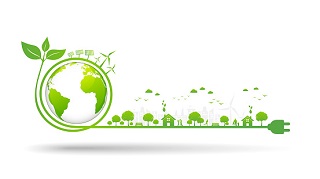Going Green in College
Posted on March 20th, 2020 by Luke Clausen
With everything that’s been in the media lately, the question of how to become more “green” is on many people’s minds. For college students, taking steps in this direction may seem overwhelming, because college is often stressful enough without thinking about these extra changes in your lifestyle. However, with a small amount of effort, there are easy changes you can make which, aside from helping you save money, will have little impact on your personal life, but a big impact on the effort to combat pollution and climate change.
Reduce Plastic Waste
The first step is awareness. According to biologicaldiversity.org, each American family takes home an average of 1,500 plastic bags, equaling a total of 100 billion, every year. It takes 12 million barrels of oil to manufacture this many bags, and only 1% of these bags are recycled. A simple solution to this problem is to buy a reusable bag and bring it with you when you shop. You can also buy a reusable water bottle. Not only will this save you tons of money, but The Water Project estimates that about 80% of plastic water bottles in the US never get recycled, and simply become litter. If you do happen to forget your reusable bag or bottle and end up needing to use a disposable plastic one, be sure to recycle it (if it’s recyclable).
Reduce Electricity Usage
Another easy way to “go green” is to reduce your electricity usage. Not only will this help the environment, but it will save you a lot of money by reducing your electricity bill. An easy step that most of us probably already take is remembering to turn off lights when we leave a room. However, you can go the extra mile and buy a surge protector, connect all your electronics to it, and turn it off when you’re not using them. This will greatly reduce your electricity usage. There are alternative options to common household appliances, such as compact fluorescent or LED as opposed to halogen or incandescent light bulbs, that last 8-12 times longer, and use 25% less energy. For other household products, you can check the labels. Appliances that save energy will have an Energy Star, while appliances that contain ChloroFluoroCarbons damage the ozone layer, and will be labeled like this: “WARNING: [Contains / Manufactured with] [name of HCFC], a substance that harms public health and the environment by destroying ozone in the upper atmosphere.”
Use Alternative Forms of Transportation
You can also reduce your negative impact on the environment by walking, biking, or taking public transit more. In addition to emitting greenhouse gasses, which trap heat in the atmosphere and contribute to global warming, driving pollutes the air we breathe. It’s also cheaper and safer to walk, so, as long as it’s a relatively close distance, walking is a no-brainer.
Switch From Paper to Virtual Media
One final thing you can do to help the cause is switch from paper to virtual media. According to Worldatlas, paper use has risen by 400% in the past 40 years. Aside from the obvious problem of deforestation, the production of paper pollutes the air and water, and paper waste crowds landfills, making up for approximately 26% of solid waste in dumping sites. To reduce your paper use, you can take notes digitally, buy digital textbooks, get your bank statements digitally, and, if you need to print, use double-sided printing.
It may take a lot of work and self-awareness to help the environment, especially in college, but there are always easy steps we can take to make sure the planet we live on is healthy and thriving. These are just a few ways you can help, but if you’re really passionate about it, there’s infinitely more, from small steps such as shopping secondhand or donating your old items instead of throwing them away to larger steps like converting to solar or wind energy; there’s a huge body of research available at your fingertips.

May 12th, 2020 at 7:48 am
Nice article, In addition to reducing greenhouse gas emissions, recycling plastic water bottles also helps to decrease the amount of pollution in the air and water sources. Many landfill facilities will incinerate plastic bottles to save waste, which can emit toxic pollutants or irritants into the ai
May 13th, 2020 at 10:28 am
So glad you enjoyed it! Thank you for reading!